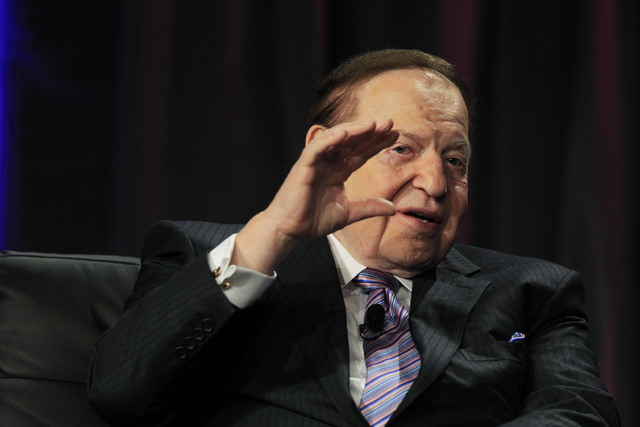Smoking ban the least of worries in Macau gambling

Earlier this month, Macau implemented a smoking ban inside its casinos.
No, the region’s $45.2 billion-a-year gaming market didn’t collapse into the South China Sea.
In fact, the new smoking rules have been the least of the problems to beset Macau this year.
The Chinese gaming enclave has experienced four straight months of gaming revenue declines. A fifth monthly drop is expected when October’s numbers are counted.
A combination of outside factors have worked to slow Macau’s gaming growth, including political unrest and pro-democracy demonstrations in Hong Kong, a crackdown on corruption by the Chinese government, economic concerns and visa restrictions that curtailed travel to Macau by mainland Chinese citizens.
The smoking ban hasn’t been noticeable.
Properties were allowed to build nongaming smoking rooms in their casinos for customers looking for a nicotine fix. The idea seems to have worked.
Las Vegas Sands Corp. Chairman Sheldon Adelson told analysts and investors earlier this month the smoking ban wasn’t hurting his company’s four Macau destination resorts.
“With all things going on in Hong Kong, the other pressures in Macau, (and) all the headwinds we have been facing, it is really hard to segregate the smoking issue directly,” Adelson said during the question-and-answer session of Las Vegas Sands’ third-quarter earnings call.
“Our anecdotal feedback is pretty positive that (the smoking ban) doesn’t appear to be impactful in any segment,” Adelson said.
Las Vegas Sands’ net revenue from Macau fell less than 1 percent in the third quarter to $2.33 billion. The figure covered the three-month period that ended Sept. 30 — a few days before enforcement of the region’s smoking ban started.
But Adelson provided analysts with some color commentary two weeks into the implementation; the smoking lounges were being used, and business appeared unaffected by the lack of cigarette smoke.
“The few people grumble a little bit about going into the smoking lounge, but they are an obedient society, and they do what the government says,” Adelson said. “And they go to the smoking rooms and they seem to enjoy and come back out.”
That assessment was echoed by analysts at the Telsey Advisory Group, which told the Macau Business Daily any fallout from the smoking ban — which began during the Chinese Golden Week Holiday — was too small to affect casino performance.
“‘Based on weekly performance, the impact has been negligible. The slowdown in average daily revenue from Golden Week to week two (of October) was actually less severe this year than last, despite the addition of a smoking ban,” analysts for the firm wrote.
Macau has taken its lumps in the last half of 2014.
Most of Wall Street has downgraded the market and lowered expectations for Macau earnings from Las Vegas Sands, Wynn Resorts Ltd. and MGM Resorts International earlier this month.
After Las Vegas Sands reported third quarter results, Credit Suisse gaming analyst Joel Simkins reduced his target price for the company’s stock by $15 per share to $72. He maintained his outperform rating, however, saying the downgrade didn’t reflect his long-term view of the company.
“We’re still fans,” he said.
Investors have been told to expect Macau’s gaming revenue to decline through the end of the year and into 2015.
Business from both high-end gamblers and mass market customers will remain pressured.
Adelson revised a prediction he made at the Global Gaming Expo this month, believing that Macau’s high-end gaming business would recover in two months once the government’s crackdown on corruption subsides.
He told analysts it might be the second quarter of next year before high-end business returns to Macau because there have been conflicting reports on the government’s corruption campaign.
Las Vegas Sands — the first casino operator to report third quarter numbers — beat most estimates.
“We remain cautious on the near-term trajectory,” Morgan Stanley gaming analyst Thomas Allen said. “The results are backwards looking and do not change the negative catalysts in the next six months.”
Susquehanna International Group gaming analyst Rachael Rothman told investors that she shares Adelson’s opinion: The decline in Macau gaming revenue is cyclical.
“In our view, customers will likely resume spending once macro and policy fears ease,” Rothman said.
No one is throwing in the towel on Macau.
Las Vegas Sands is building the $2.7 billion Parisian development on Macau’s Cotai Strip. Wynn Resorts is building the $4 billion Wynn Palace on Cotai, while MGM Resorts is building the $2.9 billion MGM Cotai. All three projects are expected to open in 2016.
Most analysts view the recent dip as just a bump in the road.
Rothman assured investors the long-term growth story in Macau remains in place.
Macau will benefit from China’s growing middle class consumer, infrastructure improvements that allow customers to visit from further distances — staying longer and gambling more — and the next wave of property openings on Cotai.
Adelson said gambling will continue to be a way of life in China.
“No one has ever suggested that the behavior of Chinese and Asian people, which has been established over a 3,000-year history, is going to change,” Adelson said. “Nobody’s changing the culture of 1.4 billion people. It simply does not happen.”
With or without smoking.
Howard Stutz’s Inside Gaming column appears Wednesdays and Sundays. He can be reached at hstutz@reviewjournal.com or 702-477-3871. Follow on Twitter: @howardstutz.












